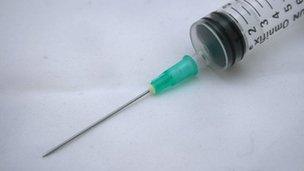Dundee University to tackle hepatitis in Tayside drug users
- Published

The project will target drug injectors with hepatitis at an early stage in the hopes of stopping it spreading
A £2.2m project to help tackle the spread of hepatitis among people in Tayside who inject drugs has been launched by Dundee University.
Working alongside NHS Tayside, researchers hope to reduce the number of hepatitis C infections by targeting drug users at an early stage.
Hepatitis C is a virus predominantly affecting the liver and is easily spread through contact with blood.
Funding has come from the Scottish government and drug companies.
The project aims to bring down the rates of hepatitis C among the Tayside population where it has been a significant and entrenched problem, which in turn should have an impact on public health and costs to the NHS.
Future savings
The university team hopes that by giving early treatment to small numbers of people who inject drugs and are infected with the virus, it will prevent the need to treat larger numbers later.
In turn this would help reduce instances of liver cirrhosis and cancer, which can develop over time if hepatitis C is not treated.
The £2.2m funding has come from the Scottish government and drug companies Janssen and Roche.
Project leader Dr John Dillon, a clinical senior lecturer and consultant hepatologist, said: "Hepatitis C is a disease which consumes a significant amount of resource in the NHS.
"The general thinking in recent times has been that the population of people who inject drugs is generally too unstable and consists of people with lives which are too chaotic to allow for the sort of sustained treatment that hepatitis C needs to achieve a cure.
"However, our view is that with the right approach, supported with appropriate resources, we can tackle what is a very significant problem and reduce the rates of hepatitis C infection."
National interest
Minister for Public Health Michael Matheson said: "This project demonstrates our commitment to invest in new approaches and efforts to tackle the disease.
"The work being carried out by the clinicians and academics in Dundee will undoubtedly be of international interest, and could significantly change the way we respond to the disease."
Hepatitis C has been a particular problem among people who inject drugs as it can be easily spread through contact with blood, so shared drug paraphernalia such as needles present a significant risk.
Dr Dillon and colleagues hope to recruit 100 patients with hepatitis C over the next five years.
They will be enrolled in a programme of treatment delivered through existing frontline specialist services.
Ann Eriksen, NHS Tayside's executive lead for sexual health and blood-borne virus, said: "The clinical trial offers for the first time the real prospect of radically reducing the prevalence of hepatitis C in the population most at risk.
"The fact that this has come to Tayside is testament to Scotland's success in tackling hepatitis C as a country and in particular to the farsightedness, innovation, skill and care of the clinical team and partner agencies."
- Published13 February 2013
- Published1 February 2013
- Published2 December 2012
- Published4 January 2012
- Published10 August 2011